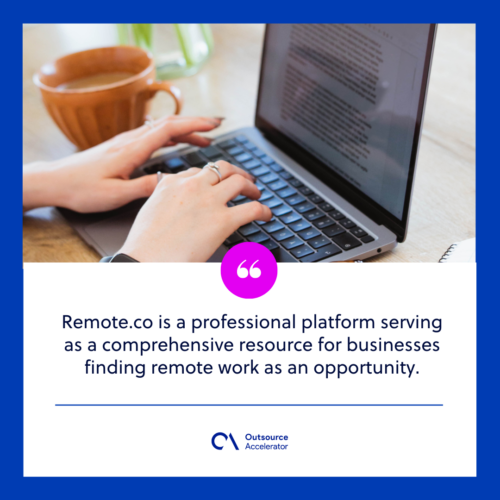Top Skills Every Remote Professional Requirements to Succeed
As remote work proceeds to improve specialist landscapes, understanding the crucial skills that contribute to success in this atmosphere is progressively essential. Effective communication, time administration, self-motivation, adaptability, and technical effectiveness are essential competencies that can substantially impact a remote specialist's efficiency.
Effective Communication Abilities
In today's remote work atmosphere, reliable communication skills are essential for success. When groups are dispersed across different places, the capability to communicate concepts plainly and pay attention actively is critical. Strong communication promotes cooperation, lowers misconceptions, and enhances efficiency.
A crucial part of reliable interaction is flexibility. Remote specialists must be able to tailor their communication styles to match diverse target markets, whether through written records, video calls, or instant messaging. Remote Professionals. Clarity in composed interaction is particularly crucial; concise e-mails and well-structured documents assist avoid confusion and make sure that messages are understood as meant
In addition, active listening plays an important role in remote communications. By demonstrating listening and asking clarifying questions, people can build rapport and trust among employee, which is crucial for keeping a cohesive work environment.
Furthermore, experience with various interaction devices is crucial. Effectiveness in video clip conferencing systems, job monitoring software, and joint applications not only boosts interaction effectiveness however likewise makes it possible for smooth team effort.

Time Administration Methods
Just how can remote specialists successfully manage their time in a setting loaded with diversions and contending priorities? One efficient method is the Pomodoro Method, which entails breaking work into periods, generally 25 mins long, adhered to by time-outs. This approach enhances emphasis and diminishes burnout, enabling professionals to maintain efficiency throughout the day.

Additionally, setting clear goals and deadlines is critical. Developing everyday and once a week objectives cultivates accountability and gives a sense of instructions. Making use of electronic tools such as job monitoring software application can facilitate task tracking and boost cooperation among employee.
Self-Motivation Methods
Self-motivation is the driving pressure that makes it possible for remote professionals to thrive in a versatile workplace. To grow this crucial ability, people can implement several efficient techniques that cultivate autonomy and performance.
First, setting clear, attainable objectives is crucial. By breaking bigger tasks into smaller sized, manageable turning points, remote workers can preserve focus and experience a sense of accomplishment as they progress. This method not just boosts inspiration but also provides a roadmap for daily tasks.
Additionally, developing a dedicated work space can dramatically affect self-motivation. An assigned area without interruptions helps in creating a specialist mindset, signaling to oneself that it is time to work.
On a regular basis organizing breaks is one more vital technique. Brief intermissions help reenergize power levels and endure concentration, preventing burnout and advertising sustained efficiency throughout the day.
Furthermore, leveraging positive support can improve inspiration. Celebrating tiny wins or fulfilling oneself after finishing jobs can create a positive responses loop that urges recurring initiative.
Inevitably, embracing these self-motivation strategies equips remote specialists to preserve high levels of performance and complete satisfaction in their work, guaranteeing they remain involved and effective in their functions.
Flexibility and Adaptability
Flexibility and versatility are vital qualities for remote professionals navigating the ever-changing landscape of remote job. As organizations significantly welcome hybrid models and moving priorities, remote workers must be prepared to adapt to brand-new scenarios with dexterity. This calls for an attitude that embraces change rather than withstands it.
Remote professionals usually deal with varying time areas, diverse team characteristics, and developing task requirements. Those that can pivot promptly in feedback to these difficulties are extra most likely to maintain productivity and foster partnership. Adaptability in scheduling can likewise enhance work-life balance, permitting professionals to maximize their output while accommodating personal commitments.
Furthermore, versatility prolongs beyond mere schedule adjustment; it entails a desire to find out description and take on new devices or techniques as they develop. Constant discovering and openness to feedback are important elements that equip remote workers to flourish in uncertain settings. By cultivating these abilities, remote professionals not only improve their own performance however additionally contribute favorably to their groups and companies.
Technical Effectiveness
In the context of remote work, technological proficiency is increasingly vital as professionals rely upon numerous electronic devices to promote task, cooperation, and interaction management. Proficiency of software application applications, cloud systems, and communication devices is crucial for smooth procedures. This includes experience with video clip conferencing tools like Zoom or Microsoft Teams, project management software program such as Asana or Trello, and joint platforms like Google Workspace or Slack.
Additionally, technological proficiency includes recognizing cybersecurity techniques, making certain that sensitive info continues to be secured during digital interactions. Remote professionals must also be experienced at fixing common technological problems, as dependence on innovation means that problems can emerge suddenly. This capacity not just reduces downtime yet likewise adds to a more effective operations.
Furthermore, remaining updated on arising innovations and fads in remote work can give an one-upmanship, allowing experts to leverage new tools that boost productivity. In general, technical proficiency is a foundational skill that encourages remote employees to browse the digital landscape successfully, ensuring they can contribute meaningfully to their groups and projects. In a progressively electronic world, this ability set is not just useful; it is essential for success.
Conclusion
To conclude, the successful navigating of remote workplace requires a thorough capability including reliable interaction, skilled time management, robust self-motivation, and the go to this site ability to adapt to altering circumstances. In addition, proficiency in relevant technological devices is crucial for keeping performance and collaboration. By growing these essential abilities, remote specialists can boost their efficiency, foster favorable interactions with associates, and inevitably grow within the advancing landscape of remote work.
As remote work continues to reshape specialist landscapes, recognizing the necessary abilities that contribute to success in this atmosphere is progressively crucial.Versatility and flexibility are vital attributes for remote specialists browsing the ever-changing landscape of remote work. By cultivating these skills, remote professionals not only improve their very own performance but likewise add positively to their companies and teams.
In the context of remote work, technical effectiveness is significantly essential as description professionals depend on numerous electronic tools to promote task, communication, and cooperation management. By cultivating these important skills, remote specialists can improve their performance, foster positive interactions with associates, and inevitably thrive within the evolving landscape of remote job.